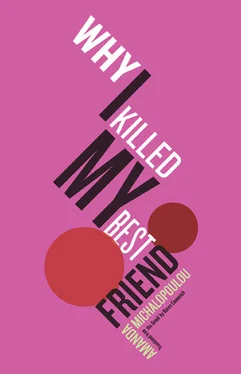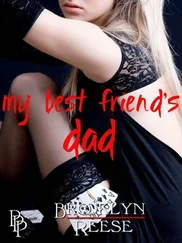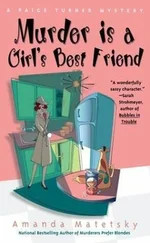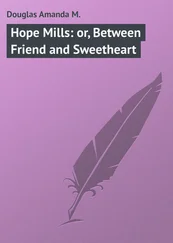Anna leaves first. She packs silently, shoving her clothes into her duffle bag as if they were dirty laundry. She makes a vague gesture with her hand. She doesn’t kiss me, doesn’t hug me; for once there’s no drama. She just stands in the doorway long enough for some parting words: “You know what Mayakovsky said? That a true revolutionary burns all bridges behind him.” And then she shuts the door.
I sit on the bed, I don’t know for how long. Hours. A whole line of Annas parade by me, at all ages, striking pose after pose, making faces, with their white eyebrows, the dimples in their chins, those big blue eyes, deceptively calm. Then I pack my suitcase as hurriedly as she had, tossing in books and clothes. I understand the plan: she’ll head to Paris and never look back. I, meanwhile, need to go someplace where Direct Action won’t find me. Somewhere with sand, heat, tropical rain.
For a start, Aegina will do.
“I want to ask you something. But I want a french fry first.”
Martha gets up from the sofa in a funny way: first her stomach, then her. She chooses a french fry off the plate — she prefers the underdone ones — and bites into it with pleasure, with her front teeth, like a beaver. A butterball beaver that purrs, rubbing its belly. She has on a loose dress of gray flannel and tattered cotton socks. She’s turned out exactly as I would have guessed: she and her husband live in what used to be her family’s summer home, that two-story house with the stuccoed walls, sliding doors and watercolors of angry seascapes on the walls. The only thing she’s gotten rid of is Kyria Pavlina’s flypaper. And their goat has long since died of old age. Her husband is so shy he blushes whenever you talk to him. He’s a notary public who works in Pireus.
Martha used to work at a travel agency by the port, but now, about to give birth and naturally chubby to begin with, the most she can manage is to stand up and sit back down again. She has no one to help her. Fotini is living in Thessaloniki with an out-of-work actor, the absolute opposite of the Harlequin romances the two sisters used to read. Kyria Pavlina is confined to her bed, suffering one kidney stone after another. As for Angelos, he married an Italian, Romina, and took over the management of her family farm somewhere outside of Sienna. They smile at us every day from a gold-framed photograph, brandishing muddy shovels as if they were tridents.
All day long I fry potatoes. Martha has a weakness for fries. The smell of hot oil makes me queasy, but it suits the melancholy familiarity of this house, with the television always on in the afternoon, a housewife curled up on the couch.
“You’re going to stay with us, right?” Martha asks the same question every afternoon while I drink my coffee and she eats her fries. Nanny, governess — now there’s a job that never crossed my mind. The older I get, the closer life brings me to Gwendolyn. “You’ll have your own room, you can do your art in there and play with the baby, right?” Ever since she was little Martha has spoken almost exclusively in questions. She opens her eyes wide and looks at you as if the end of the world has arrived.
“We’ll see.”
My room is Angelos’s childhood room. There are still pencils and erasers in his desk from when he was a teenager and would shut himself up for hours, before he started breaking girls’ hearts. There’s still something masculine in the air, a lingering smell of stale aftershave. Martha brings in roses from the garden and little pots of basil, but to no avail. Only when winter has finally come and in place of those flowers Stella’s toys sprout one by one do I forget that I’m sleeping in Angelos’s old bed.
At first I don’t go near her crib. I’m afraid of those tiny fingers that shape themselves into fists, afraid of the furrowed skin, the tongue that paints her toothless gums with spittle. Then she starts to make the most thrilling sounds: deep vowels full of existential doubt, guttural noises that sound like attempts at a laugh. I could watch her for hours on end and never get bored. Now that the hole in my head has opened and let out the cave and the burglars, Stella is a comfort, a replacement for lost siblings, dolls, and childhood friends.
Martha senses it, and has stopped asking.
“You’ll stay,” she says.
•
I knit socks and hats for Stella. The only art I still remember is this circular form of fencing: knit, purl, slip stich. I knit until my needles spark. Beside me on the sofa, Martha is nursing the baby, watching her afternoon shows out the corner of her eye. The baby drinks greedily, eyes closed, like a cat. For an instant I feel like I’ve returned to my childhood house and am watching my mother nurse my little sister. I’m afraid I might be losing it. It wouldn’t take much, just a few more holes in my head to unbury themselves all at once.
I miss Anna. She visits me now and then in my dreams, smacks kisses on both of my cheeks, so hard that my cheekbones shatter as if they were made of glass. I guess we didn’t say a proper goodbye. We buried each other hurriedly, so that afterward we both simply stood up from our imposed graves and shook off the dirt. This Aztec pattern with the orange zigzags I’m knitting would look good on her. I could send her a hat in the mail. Or I could call.
No one picks up at the apartment in Paris. I try every half hour, it becomes an obsession. It seems to me that the phone is ringing directly in Anna’s gut, in her heart, and that she’s not picking up because she no longer cares. She’d rather pretend I don’t exist. I remind her of the weakest, darkest part of herself. As she does for me: if I shook myself like a tree, whatever still clung to the branches would have something to do with Anna. All the heaviest, saddest things. And heaviest of all would be the dead body of the Albanian. The corpse of our friendship. He did turn out to be Albanian, after all — brief articles buried in the back pages of the daily papers said it was probably a crime perpetrated by the Albanian mafia. He appears regularly in my dreams, too, or in my nightmares, face-down in stagnant water. His shirt pops like a balloon and giant crickets crawl out.
I devote myself wholeheartedly to Stella. We have vowel competitions, play airplane on the sofa, count how many hops the bunny of my hand takes to reach her neck for a drink of water. In early summer Martha goes back to work at the travel agency and Stella starts to confuse me with her mother, the way I once did with Gwendolyn. For the umpteenth time in my life, I have something that I also don’t have. I had and didn’t have a sister, a doll, a friend. I had and didn’t have a personal revolution. I had and didn’t have Angelos, Kayo, Camus. I’m sure Camus is still chain-smoking in his apartment. Kayo is living his fake life in New York. As for Angelos, he now belongs to a classic Italian wife who is unrepentantly Catholic and jealous.
These are the kinds of thoughts I think as I push Stella’s stroller down to the wharf. We stay there awhile, I sing a lullaby, the baby stretches her arms out to grab the sun—“thun.” My ears are numb from the heat, my heart numb with borrowed happiness. I’ve lost everything, but Stella gives me the illusion of a new life.
Until one day, on our usual walk, something sticks in my throat, my heart contracts. The sun, the soft, steady breaking of the waves, Stella’s smile — nothing can calm me down. I turn my head, pretending to be looking for something I dropped. Twenty meters behind me a man is walking and smoking, a newspaper under his arm. I don’t need to look a second time. The quiet rage in his eyes, the invisible revolutionary’s wings sprouting from his shoulder blades. And his fingers, yellowed for sure. I bleed, therefore I am.
Читать дальше












